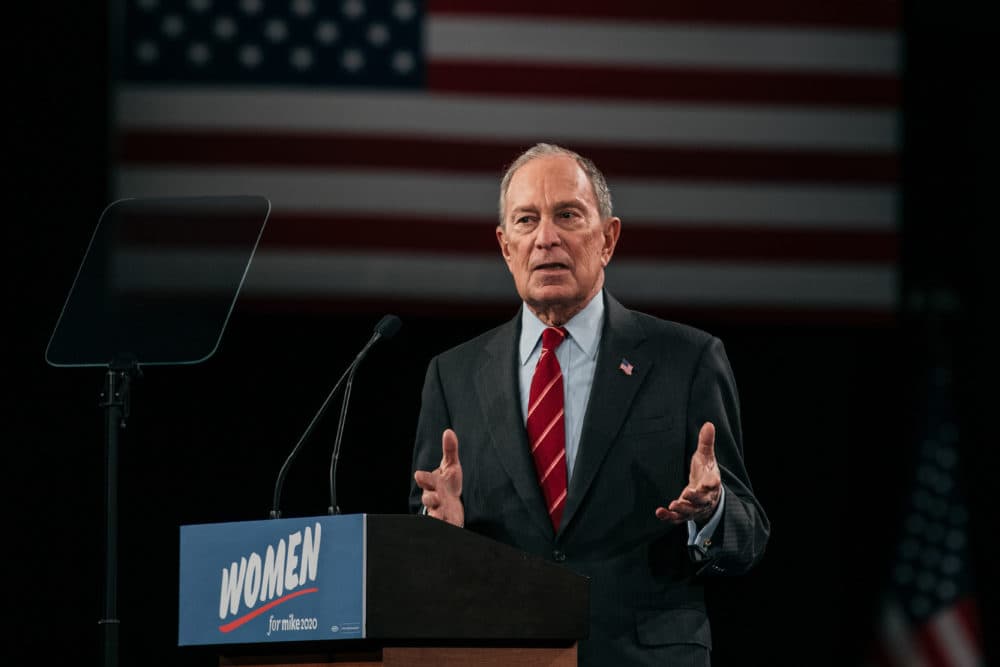Advertisement
Michael Bloomberg Outspends Rivals On Presidential Campaign Ads
Resume
Former New York Mayor Michael Bloomberg is vastly outspending his rivals for the Democratic presidential nomination in political campaign advertisements.
The billionaire is on track to spend up to $400 million on advertising before Super Tuesday in early March.
So far, Bloomberg has also spent more on advertising than President Trump, who called Bloomberg’s ad blitz a “vanity project” on Friday and said the ads were “purposefully wrong.”
That level of ad spending in such a short time period — Bloomberg entered the primary race in early November — has never been seen before, says Ken Goldstein, a professor who studies political advertising at the University of San Francisco.
“Tom Steyer has also spent about $150 million,” he says. “So you have these two billionaire Democratic candidates basically spending four out of every five dollars that's been spent on the presidential race, dominating the race, but not spending it in the early states of New Hampshire and Iowa.”
Goldstein says that political advertising doesn’t matter very much in terms of outcomes, and the theory is that the effects of it “tend to be fleeting.”
“You might get a little bit of a sugar high off the advertising, but then at some point, you can't spend that much money for that long and have that big of an advantage for that long,” he says.
But some analysts argue there’s a chance Bloomberg could buck the trend.
“It may just be the case that he’s going to have that advantage for that long in Super Tuesday states,” Goldstein says.
Interview Highlights
On the strategy behind Bloomberg’s ad campaign
“He's in places like Houston. He's in New York, Los Angeles, San Francisco, Dallas, Chicago. Listen, he's everywhere. I'm a bit surprised that he's not spending more nationally. So there's reasons to buy locally if you want to get the local news. But I think if you're buying in so many markets and so many expensive markets, it actually would have been cheaper to buy nationally.”
On Bloomberg’s plan to buy a very expensive Super Bowl ad along with Trump
“Both Donald Trump and Michael Bloomberg are spending $10 million on a Super Bowl ad. I think Bloomberg, I hear, is actually going to be spending a little bit more. So Fox is charging $10 million for the Super Bowl ad, but then to get the right to buy the Super Bowl ad, you then have to commit to another $5 or $6 million in spending on Fox.”
On the messaging in Bloomberg’s ads
“It is a general election ad by definition in those places, because those are mostly states that are going to be battleground in a 2020 fall general election. … And listen, maybe it's also saying, 'Hey, you need to listen to Michigan and not only pay attention to Iowa, New Hampshire, the early states.'”
On if this ad strategy is worth the cost
“Listen, it sounds like the obvious thing to say, but that may just not be a meaningful amount of money to him when he's worth X billion dollars. He also probably thinks that his advertising will have some positive impact for the Democratic nominee, even if he doesn't get the nomination, which really is a long shot because we're about to go into an environment now which is going to be consumed by impeachment. And what's not consumed by impeachment is going to be consumed by free media coverage, earned media coverage of Iowa and New Hampshire and then the results of Iowa and New Hampshire. And it's really difficult to compete with what the coverage is going to be out and the bounce that whoever comes in first and second in Iowa and New Hampshire is going to get.”
On the argument that the billionaires in the race are buying name recognition
“They're clearly buying name recognition and the candidates on the Democratic side certainly still have the ability to get their message out. What's interesting about this is there's lots of criticism of Iowa and New Hampshire coming early and such small, non-representative states having such a huge impact.
“Listen, I'm not sure you can buy an election, but certainly hundreds of millions of dollars in advertising would have much more of an impact if there was a single Democratic primary day. Hundreds of millions of dollars in advertising would have much more impact if California or New York was the first primary. So the fact that Iowa and New Hampshire [are first], where the candidates still have to go from living room to living room and talk to people, does blunt the effect of that money a little bit. And the free media coverage that whoever wins or comes in second in Iowa and New Hampshire will allow them to compete with a Michael Bloomberg. Look at our current president, how he won the nomination. He actually did not spend a lot on political advertising. He took every single opportunity to speak on radio, every single opportunity, of course, to speak on national cable TV. And it was that that vaulted him into the Republican nomination.”
Chris Bentley and Francesca Paris produced and edited this interview for broadcast with Todd Mundt. Samantha Raphelson adapted it for the web.
This segment aired on January 17, 2020.
